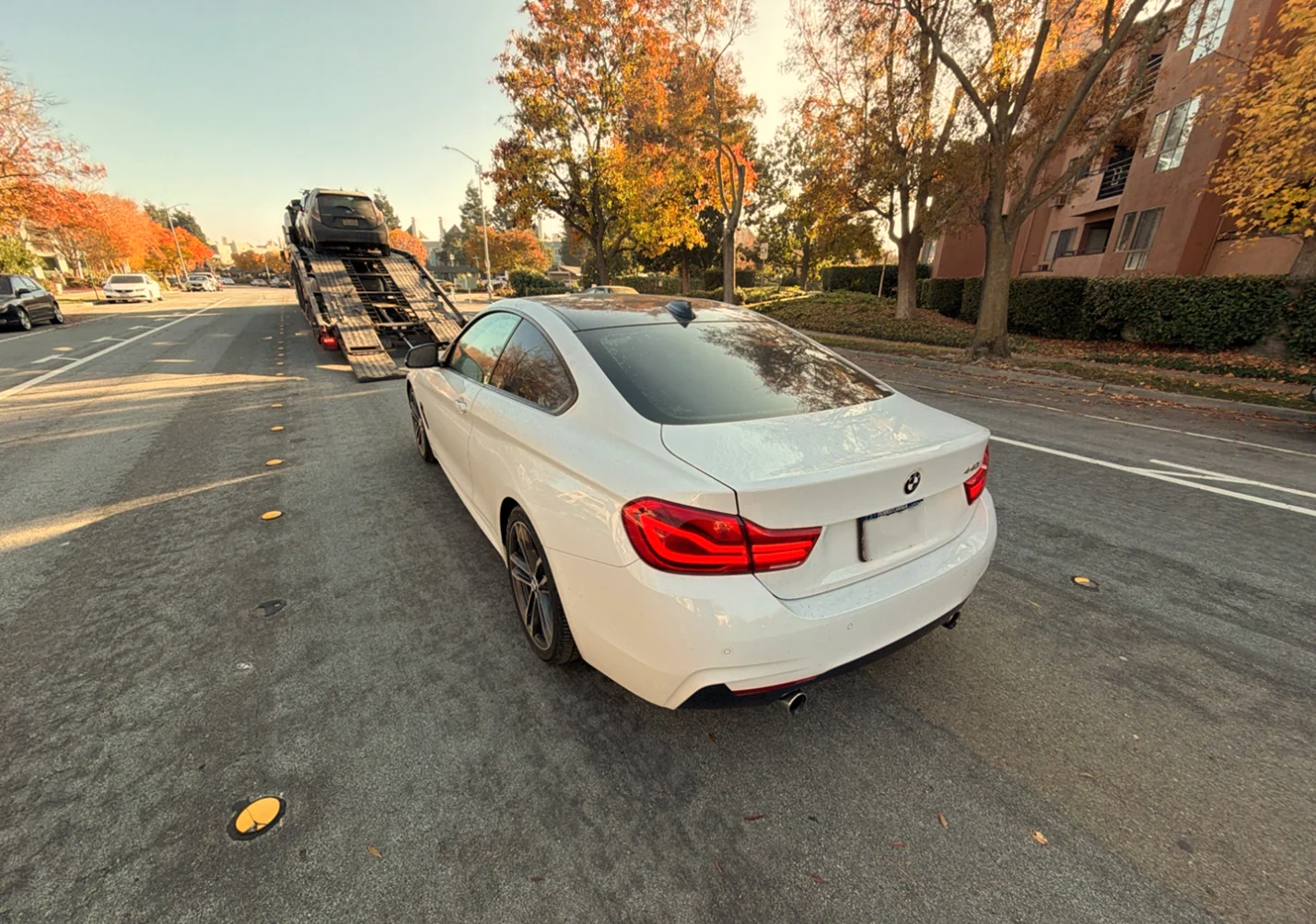Tempus Logix Wants To Take A Moment To Say Thank You
This year brought challenges and plenty of miles on the road and through it all, you trusted us with your vehicles. That means everything to our team.
To all customers called Tempus Logix for a quote or booked a shipment with us, we appreciate your time and trust. To the companies that we partnered with throughout the year of 2025, thank you for choosing Tempus Logix. Your trust keeps our drivers moving and our business growing.
The holidays remind us why we do this work. Families reunite across state lines. People start fresh chapters in new cities. Military personnel come home. College students head back for winter break. We play a small part in those moments by getting vehicles where they need to be.
As Christmas arrives at your houses, we hope to find time to rest and celebrate with the people who matter most. Our team will be ready when you need us again in the new 2026 year.
From all of us at Tempus Logix, Merry Christmas and Happy Holidays.
Here’s to safe travels and smooth roads ahead in 2026.
Enclosed Lamborghini Huracan EVO Transport from Encino CA to Bozeman MT
The transport of a 2022 Lamborghini Huracan EVO from California to Montana is hardly similar to transporting an ordinary car. The car has only 3.5 inches of ground clearance, and regular loading ramps would be completely impractical. Any scratch to the front splitter could cost thousands of dollars. This is why the best car transport companies hire expertise and utilize enclosed car transport for such valuable shipments.
The distance between Encino and Bozeman is approximately 1,100 miles and involves passage through some mountain ranges. Additionally, in winter, everything becomes harder; hence, best car transport companies will prioritize safety in their shipment strategies.
Enclosed Trailers vs. Standard Auto Transport
Hard side enclosed trailers come with steel or aluminum sides that encase your car in a protective vessel. Unlike soft side options with vinyl curtains, these hard sides keep out the elements as well as road junk. The two-car capability of these trailers benefits exotic cars with added space and security.
In normal automobile transport, open carriers are used, which transport between seven and ten cars simultaneously, and your car gets exposed completely to weather like rain and snow and also gravel on the way. The main differences are:
Super car transport differs from standard car transport in these ways:
- Indoor, controlled climate
- Loading equipment designed for low-clearance cars compared to conventional ramps
- Two-car capacity versus larger multi-vehicle shipments
- Premium Pricing for Specialty Equipment
- Requirements for expert handling as opposed to conventional driving tuition
This comes with a higher price for hard side trailers due to lower trailers, although for sports cars that cost $200,000, this comes as a distinct advantage.
The Reason Lamborghini and Supercar Owners Choose Enclosed Transport
Protection from the elements ranks as the primary reason owners select enclosed transport. Mountain highways expose vehicles to extreme temperature swings and sudden weather changes. A hard-sided trailer maintains stable conditions regardless of outside factors.
Road debris poses another serious threat to exotic car finishes. Semi-trucks kick up rocks and gravel at highway speeds. One impact from flying debris can chip paint or crack a windshield. The enclosed walls prevent any contact with road hazards.
Privacy matters to many supercar owners as well. An enclosed trailer keeps your vehicle hidden from view during the entire journey. No one knows what’s being transported inside. This reduces theft risk at fuel stops and overnight parking locations.
The climate control systems in premium enclosed trailers prevent condensation buildup. Temperature stability protects leather interiors and sensitive electronic systems. Your Lamborghini arrives in the same condition it left California.
Proper Loading Techniques for Vehicles with Low Ground Clearance
As the Huracan EVO is only 3 and half inches from the ground, it was important to ensure standard ramps wouldn’t scrub the front splitter, so tilt-bed rollback trailers are employed to avoid any contact with the car. In a tilt-bed rollback, the bed goes down to the ground level, and the car rides or drives over it without any tilt. The chassis will remain undamaged in this procedure.

The loading process takes approximately 50 minutes for exotic vehicles. Drivers position soft basket straps around each wheel to secure the vehicle. These padded straps prevent any metal-to-metal contact that could damage the wheels or suspension components.
Go-Jaks wheel dollies offer an alternative loading method for ultra-low vehicles. These hydraulic dollies lift each wheel independently and roll the car onto the trailer. The vehicle never touches the deck during loading. Race cars with aggressive aerodynamic components often require this approach.
Best Shipping Routes for California to Montana Auto Transport
From Encino, California, to Bozeman, Montana, the clear route follows I-5 north and then curves east from Oregon, Idaho, into Montana—a journey of some 1,200 miles in fair weather. But winter poses its own problems, as the Cascade range in Oregon, as well as the mountains of Montana, can CLOSE highways suddenly. And in Montana, the high mountains cause snowfall that can stop traffic in its tracks.
Seasonal routings are helpful. The best weather windows occur in the fall and spring; summer is easier to schedule, although it’s quite busy. For the winter route, allow additional time in case of weather-related delays.
What Residential Delivery Means for Enclosed Trailer Access
Residential delivery in Bozeman can also be challenging for two reasons. Firstly, it might be difficult for enclosed trailers measuring 32 feet in length due to wide turning circles. Other factors may also interfere in this kind of delivery. A call will come through between 12 to 24 hours before delivery to confirm whether your address is convenient enough for delivery.
Alternatively, they will provide you with another place very close to your location where delivery is done to your premises through your vehicle in cases where your address is not convenient enough.

Similar Residential Delivery: Smooth Transport of a 2021 Mercedes-Benz E-Class
Payment Options for Super Car Transport Services
Tempus Logix offers two payment structures for enclosed and open car transport services. The partial cash on delivery option splits the total cost between booking and delivery. You pay a small amount by credit card when confirming your shipment dates.
The driver collects the remaining balance in cash when delivering at your location. This super car transporter cash payment method gives you time to inspect the vehicle before final payment. You can verify the condition matches the original pickup documentation.
Full credit card payment processes the entire amount before the driver gets to the pickup location. This option provides complete financial closure before transport begins. You receive your vehicle without any cash payment at delivery. Both methods work equally well depending on your preference.
The booking deposit only gets charged after the carrier confirms pickup scheduling. You never pay anything until a driver is assigned to your shipment. This policy protects customers from paying for services that haven’t been arranged yet.
Shipping Summary
Vehicle: 2022 Lamborghini Huracan EVO
Route: Encino CA to Bozeman MT
US-101 N → I-405 N → I-5 N → I-80 E → I-84 E → I-15 N → I-90 E
Service: Hardside 2-Car Enclosed Trailer
Duration: 3 Days Delivery
Boat Transport by Road: All you Need to Know
Transport companies complete tens of shipping processes under the US bridges and on its highways daily; some could be for cars, others for motorcycles, and others for heavy equipment and boats. Boat transportation stands out as the most complicated and rigorous of all the vehicles mentioned earlier.
Because boats are bulky motor vehicles designed to be driven on water, transport companies always find boat transport by road challenging. Since it’s more cost-effective and faster than freight shipping, it has grown popular among clients.
So, if you have a boat and need to ship it safely and on short notice, you must consider boat transport by road. What is it and how to get the best of it, read till the end.
What is Boat Transport by Road?
Boat transport by road is a safe and very cost-effective method of punctually shipping your vehicle from point A to point B. The boat transport by road process revolves around lifting on and lifting off the boat on the back of a huge trailer.
Because a boat is usually enormous, the shipping company won’t provide you with open and enclosed auto shipping trailers, just like the case of car shipping. Rather, companies always transport boats on an extensive open trailer.
Get to Know Factors Influencing Boat Transport by Road Cost
1. Size & weight
The size and weight of your boat are the most influencing factors regarding boat transport quotes. A wide and cumbersome boat will need more workforce, additional equipment, and more cautious handling throughout the shipment. Your boat’s height, in addition, is a significant constraint since towering boats need to plan special routes and avoid some bridges along the way.
2. Distance
Logically, pulling a boat weighing a minimum of 400 pounds will be very fuel-consuming. The longer the distance, the more fuel burns, and consequently, the more the cost. In addition, since one trailer can’t possibly fit more than one boat, the company won’t be able to dole out the fee to several people heading to the same destination, similar to the case of shipping cars or motorcycles. Rather, you will be the only one paying for the fuel, workforce, and equipment utilization.
Research Reputable Boat Transport Companies
As discussed earlier, moving a boat isn’t a small project; it’s a ticklish process requiring a professional, experienced shipping company. The company you should hire should have been long enough in the market to be acquainted with bulky boat handling.
In addition, a trustworthy boat transport company must be licensed and willing to provide its DOT number confidently. We also advise comparing many boat shipping quotes from different companies before settling for any to get the best deal. And remember, quality service is offered for a fair price, not a cheap nor an expensive one.
Visiting companies’ websites to read past clients’ reviews and check the feedback is always an advantageous move. Reading reviews will provide you with a comprehensive insight into the companies’ service quality, which one most stands out, and what is the best to hire.
Tempus Logix can provide quality shipping for all kinds and sizes of vehicles. Besides the long years of experience in the auto transport industry, the company has over 1000 online reviews from satisfied clients.
Read more About Boat Transport Companies.
How to Prepare Your Boat for Transport
1. Measure your boat’s dimensions
As the width, length, and weight are the factors deciding your boat shipping quote, it’s crucial to make the measurements carefully. You also must remember the swim platforms and outboard motors, so don’t forget to measure them.
2. Secure everything
Before the shipment, you must completely secure anything loose or extends beyond the boat’s hull. Hatches that might cause leaks should also be secured using tape. You must also lock or tape the doors to avoid collision with any outside item.
3. Drain all tanks
Emptying all water and fuel tanks is an essential step before the shipment to stay ahead of any accident or fire possibility during the trip. Some transport companies recommend leaving approximately ¼ of the fuel tank full. However, that’s not a standard procedure, so ensure you confirm with the company you hire. You should also remove anchors from the deck and drain plugs from the hull.
4. Clean and inspect your boat
All shipped vehicles, whether SUVs, cars, motors, or boats, are subject to different kinds of accidents. When the shipping company’s responsibility is to offer insurance to cover damages, if occurred, your responsibility is to be able to spot these damages.
The first and most critical step to ensure your boat’s safety is to clean it impeccably. Washing the boat will unravel any damage or scratch on its body, enabling you to identify its pre-shipping condition and compare it with the post-shipping one.
The Bottom Line
Boat transport by road is a safe and affordable way to ship your boat to another state stress-free. To ensure your motor vehicle arrives at its destination safely and sound, hire the best company in the market and prepare your boat effectively by following the tips mentioned above.
Winter Car Shipment Completed From West Lafayette, IN to San Diego, CA
Cross-country transport costs of a car vary based on a number of factors. Distance is one of the biggest factors in determining the overall transport cost of a car. The car’s size is also important. Transport type and season can also vary your transport costs. The distance of a transport service of a car from West Lafayette to San Diego is approximately 2,100 miles. Recently, it has actually cost $1,439 to transport a 2017 Ford C-Max Energi with open transport.

See Also: California to Indiana : Safe and Fast Auto Transport
How Much Would It Cost to Transport a Car Across the Country?
Cross-country car transport can cost anywhere from $1,100 to $1,600. The cost per mile can potentially decrease over longer distances. The cost per mile for shorter shipments, which are under 500 miles, can cost more than for shipments over 1,000 miles.
Open transport is the cheapest option. Approximately 90% of customers opt for this. Your car will be moved on a multi-level trailer with other cars. This option, which provides protection from the weather, costs between 40-60% higher than the above option. People shipping their personal cars normally go for the open transport option to cut costs.
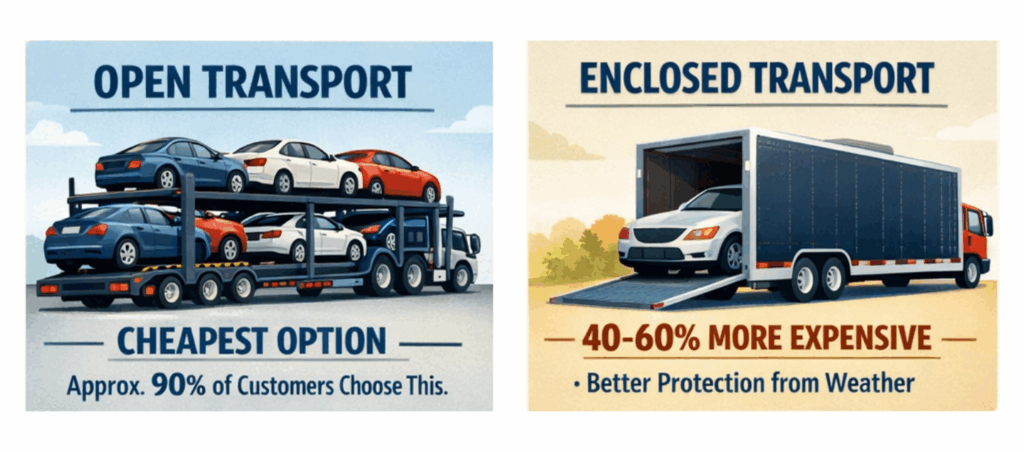
The seasonal variation also impacts pricing. Peak seasons, between May and September, have a 10-15% surge in prices attributed to a high demand for vehicles during summer vacations. However, during winter, prices are cheaper, although flights may be prone to delays. Vehicle condition also plays an important factor. Inoperative vehicles require winches and equipment for lifting, increasing expenses by $100 to $300.
Price Estimate Through Auto Transport Calculators
Requesting a quote does not have to be a chore. Tempus Logix provides an online AI-Powered calculator tool that gives immediate quotes. You simply provide minimal information about your shipment. The calculator requires the pick-up and delivery zip codes. It also inquires about the vehicle make and model. The choice of transportation mode then follows.
These tools rely on data that is current in the market. They take into account the price of fuel and the availability of a carrier. The amount you are given will be a close estimate to the final price. Other companies may provide you with estimates that can change slightly if a carrier is assigned.
Pictures of your car also assist in the process. They indicate the condition prior to the time the shipping process begins. Photos also protect you as well as the shipping company. They eliminate potential disagreements about pre-existing damages.
How to Book Auto Transport in 5 Easy Steps
The booking process is quite fast if you are equipped with the necessary information.
- It begins with the quote request. Information on the vehicles and the route is provided. The company examines the points of pickup and delivery. They examine if there are any special handling requirements.
- Once you accept the quote, the process of booking is finalized. The firm locks in your pickup time. The firm assigns a driver based on route and timing. The type of trailer corresponds to your needs. The insurance coverage is also verified at this stage.
- Then follows the process of communication. You are provided with the carrier contact details. Your driver contacts them with regard to the details of picking them up. They agree on a particular time and place. It brings them on the same page.
- Pickup day arrives with a complete vehicle inspection. This involves assessing the state of the vehicle. The driver records the status of the vehicle. Photographs are taken from all angles. This is followed by the preparation of a Bill of Lading, after which the document is signed.
- Tracking continues all the way. Updates may be requested at any time. Support team members provide information about present location and estimated times of arrival. As delivery nears, the carrier will call to arrange dropoff. Final inspection checks the vehicle against information from pickup.
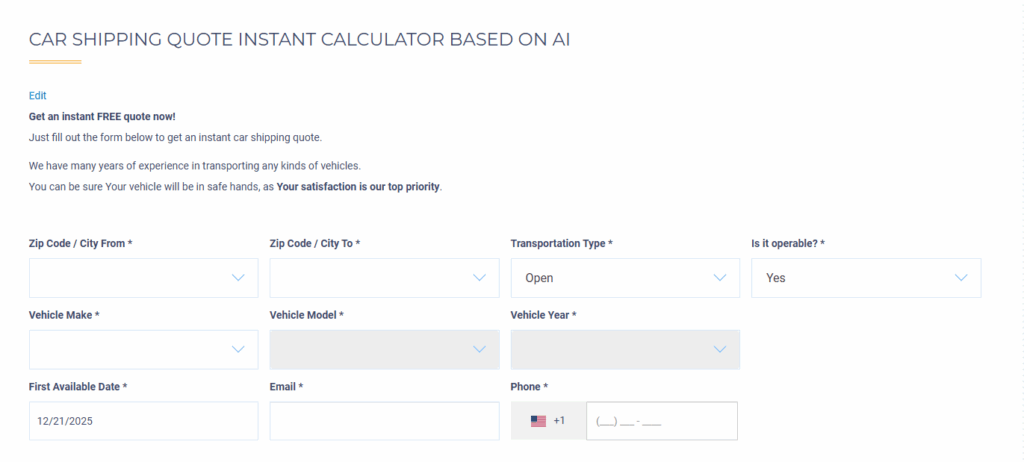
Transporting Cars from Midwest to West Coats
Winter in Indiana presents a number of challenges when shipping a car. Snow covered the ground at the time of pickup in West Lafayette. The carrier had to drive through icy parking lots to deliver the vehicle. Carriers must be properly equipped if they are going to ship in a winter environment.
It could not be more different in delivery. Sunny California weather awaited the car in San Diego. No ice to concern oneself with. No snow to plow through. The difference in temperature from pickup to delivery was over 50 degrees. Such is how one can see the effects of seasonal changes on delivery time, but not safety.
Interstate routes link the Midwest region to the West Coast efficiently. Truckers take interstate I-80 and I-70 routes wherever possible. Interstate routes are heavily traveled by trucks throughout the year. Delays caused by weather are rare, but professional truckers are well-prepared for such delays.
Why It Takes Longer to Ship a Car Compared to Driving It
It would take approximately 30 hours driving straight through. It could be accomplished in three days with overnight stops. The time involved for an auto ship would be 7-10 days. This basically has to do with how carriers function. Transport trucks do not drive straight to a particular destination. They carry loads picked up from other places along the route.
Every station increases their schedule duration. Deliveries also take place at different spots. A transport truck may carry between 8 and 10 cars per journey. Every car also follows a specific timeline. The government regulates driving hours. Drivers have to comply with regulations concerning resting hours. This is to prevent tiredness and ensure road safety. A personal driver can continue driving with less resting time.
A commercial vehicle driver cannot. Loading and unloading also take time. Securing vehicles is important to ensure they are moved safely. Inspections before and after delivery also take up time. Inclement weather and road traffic also cause delays that independent truckers could avoid.
Shipping Summary
Vehicle: 2017 Ford C-Max Energi
Route: West Lafayette, IN to San Diego, CA (2100 mile)
I-65 S toward Indianapolis → I-70 W through Illinois, Missouri, Kansas, and Colorado → I-40 W across the Southwest → I-15 S into San Diego, CA
Service: Multi Car Hauler | Open Trailer
Cost: $1,439.00 ($0.68 per mile)
Season: Winter
Iconic Classic Car Intrastate Shipping: Delivery From Ocala, FL to Tampa, FL
We had the chance to ship a beautiful 1964 Ford Mustang across Florida this month. The route ran from Ocala down to Tampa. Getting this muscle car where it needed to go took some careful planning.
The owner wanted his vintage ride protected from Florida’s weather. We used enclosed auto transport for the job. The car stayed dry and safe during the 100-mile trip south.
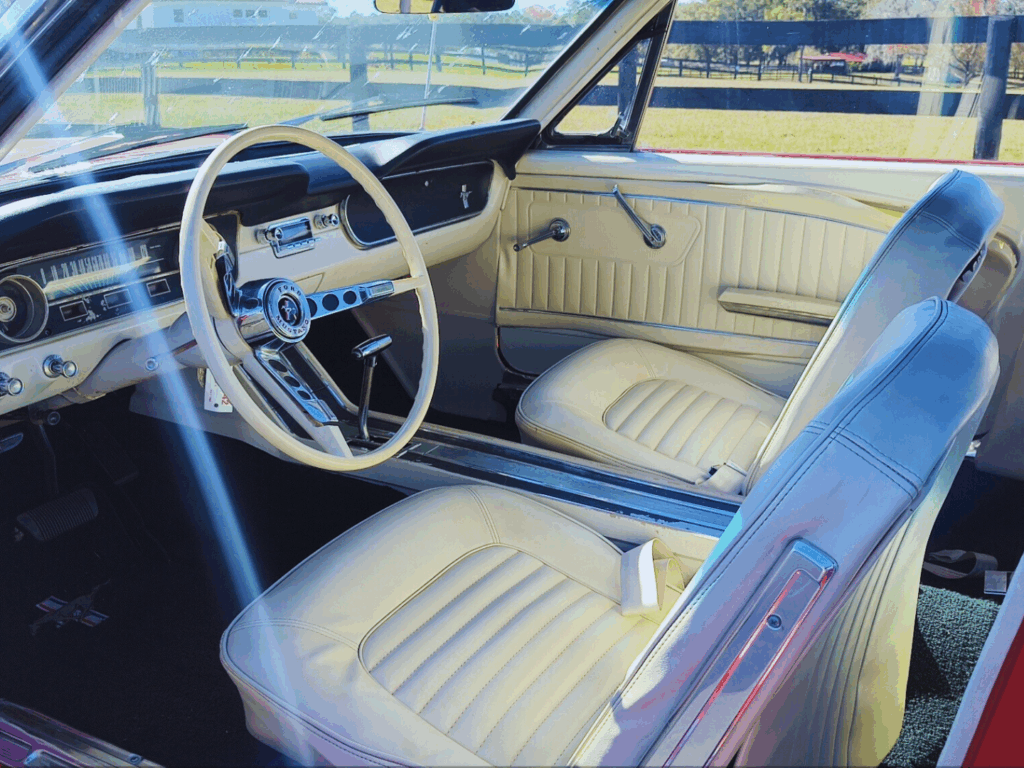
Transporting Iconic Classic Cars: 1964 Ford Mustang Specifics
The ’64 Mustang isn’t just any car. It’s one of the first production Mustangs ever built. This particular model had original paint and factory parts still intact.
We don’t take chances with cars like this. The driver assigned to the job had 12 years of experience moving collector vehicles. He knew exactly how to handle a car worth more than most people’s houses.
The Mustang weighed around 2,800 pounds. It sat low to the ground with just 5.5 inches of clearance. Loading required aluminum ramps and slow movements to avoid scraping the front bumper.
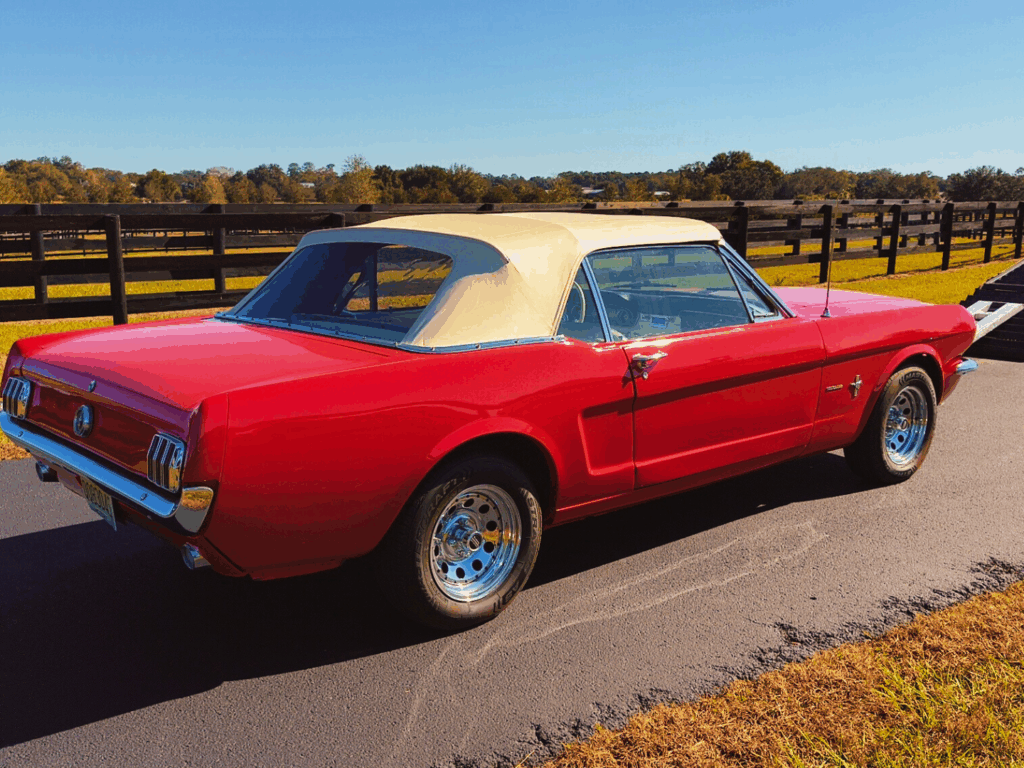
What Makes a 1964 Mustang a Classic Car
The first Mustangs rolled off the assembly line in March 1964. Ford sold over 400,000 units that first year. Today these early models are considered automotive history.
This wasn’t the fastest muscle car of its era. What made it special was the design and the cultural impact it created. The long hood and short deck became iconic instantly.
Original ’64 Mustangs in good condition now sell on average for $30,000 to $60,000. The value depends on whether you have the V8 engine or the base inline-six. Restored models with documentation can push even higher.
White-Glove Service: Premium Dealer Delivery for High-Value Classics
High-value classic cars get extra attention from us. We call this premium dealer delivery. It means more than just moving a car from point A to point B.
The service includes climate-controlled enclosed trailers. Temperature extremes can damage vintage interiors. Florida heat in August would fade original upholstery fast.
Our drivers wear shoe covers when getting in these cars. Small details matter. You don’t want boot prints on the original carpet of a 60-year-old Mustang.
Door-to-door delivery is standard. The carrier backed right into the owner’s lot in Tampa. The Mustang never sat outside during the entire transport process.
See Also: Multi-Million Dollar Classic
Common Issues to Prevent When Shipping 1960s Muscle Cars
Old cars have different needs than modern vehicles. The first concern is ground clearance. Many muscle cars from the 1960s sit lower than today’s sedans.
Fluid leaks happen more often in vintage cars. We check for oil drips before loading. The carrier needs to know if transmission fluid might leak during transport.
Another thing worth noting is the paint condition. Original factory paint on a ’64 Mustang can’t be replaced. Any chips or scratches lower the value immediately. That’s why we always recommend enclosed classic car shipping for older vehicles.
Batteries in classic cars sometimes disconnect during loading. We make sure connections stay tight. Dead batteries at delivery aren’t acceptable.
What to Expect During the Classic Car Transport Process
The process started with photos. We documented every inch of the Mustang before it left Ocala. The owner stood next to us during the inspection.
Loading took about 20 minutes. The driver positioned ramps at the right angle. He drove the car up slowly with another person spotting from the side.
Once loaded, the Mustang got strapped down with soft ties. These don’t damage chrome or paint. Four contact points kept the car stable without putting pressure on the suspension.
The drive to Tampa took roughly two hours. Our driver called when he was 30 minutes out from delivery. The owner met him at the destination address.
Typical Transit Times for 100-Mile Classic Car Intrastate Shipments
Short hauls like this usually complete in one day. The Ocala to Tampa route covers about 100 miles on I-75. The weather was clear so the timing stayed on schedule.
Some vintage car transport can take longer if permits are needed. Oversized loads require special routing. This Mustang fit standard enclosed trailer dimensions so no permits were required.
We picked up the car on a Tuesday morning. It arrived in Tampa that same afternoon. The owner had his Mustang back before dinner.
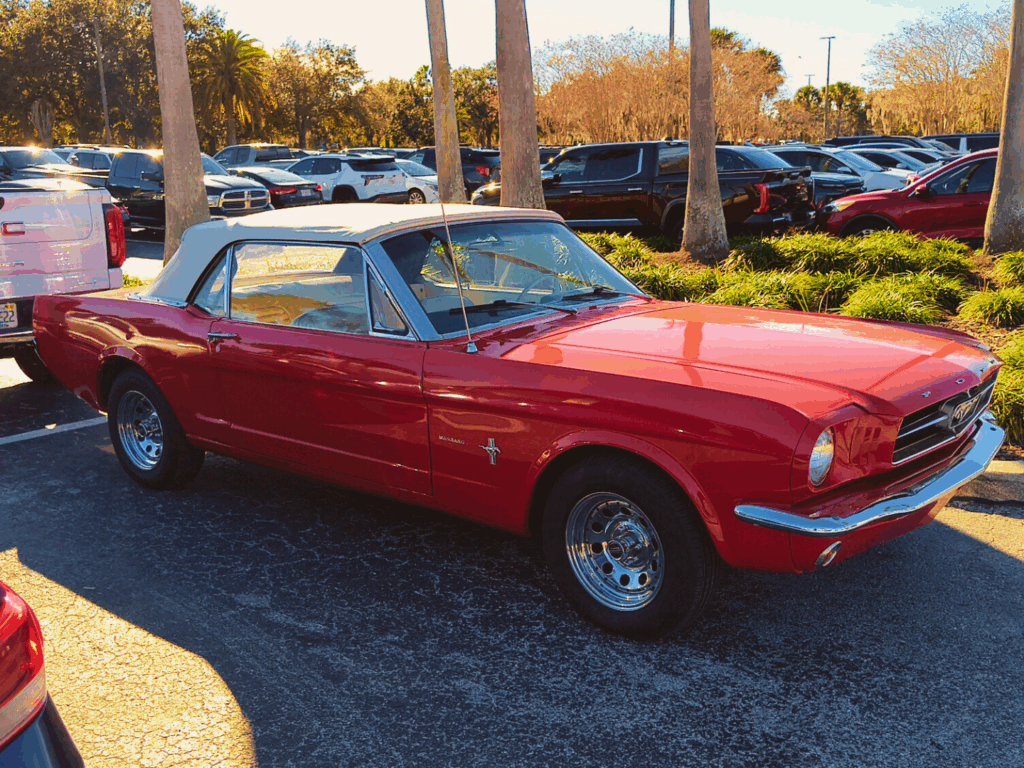
Insurance Requirements for Transporting a 1964 Ford Mustang
Insurance becomes more complex with collector vehicles. Standard auto transport coverage might not be enough. The declared value needs to match the car’s actual worth.
We carried $500,000 in cargo insurance for this job. The policy covered the full appraised value of the Mustang. The owner provided documentation from his insurance company showing agreed value coverage.
Some carriers won’t insure cars over certain amounts. They cap coverage at $100,000 or $250,000. We work with specialized insurers who understand classic car values.
Before the transport, both parties signed a Bill of Lading. This document listed the car’s condition and confirmed the insurance coverage. Florida law requires carriers to maintain this paperwork.
The owner also had his own collector car policy active. His insurance stayed in effect during transport. This created dual coverage in case something unexpected happened.
Shipping Summary
Vehicle: 1964 Ford Mustang
Route: Ocala, FL to Tampa, FL
I-75 South directly from Ocala to Tampa
Total price: $350.00 ($3.5 Per mile)
Service: Enclosed Trailer | Single Car Hauler
Season: Winter
Safety Measures for Motorcycle Transportation
“Four wheels move the body, but two wheels move the soul.” That’s how bikers think of their precious motor vehicles, which is why they hesitate when choosing a motorcycle transportation company.
They are the only ones who feel the sensitivity of shipping their motorcycles. Whenever they need to travel a long distance, they must go through the burden of arranging the shipment and ensuring the auto transport company is efficient and reliable enough to handle the job.
Lots of planning and preparation are required to ensure a safe journey and an accurate delivery date. In this article, we’ll demonstrate the safety measures for motorcycle transportation.
Find a Trustworthy Auto Transport Company
People often face challenges while trying to choose the best auto transport company among plenty of available choices, which is not an easy task. However, here are a few things to consider when comparing all provided services.
- The legal situation is the first thing to check; no one wants to entrust their precious motorcycle to a company that can’t operate legally. Motorcycle transportation follows the safety and insurance regulations set by the Federal Motor Carrier Safety Administration. Therefore the company must have a valid MC number.
- Relevant experience is a must; it is a critical factor that can measure the company’s efficiency. A track record full of successful motorcycle transportation is powerful proof that shows whether the company is trustworthy or not.
- Customer reviews are also one of the essential comparison aspects since they tell much about the service and the company itself. Customer reviews aren’t meant to compliment the company and its services; it is nearly impossible to satisfy everyone. However, how the staff replies to negative comments and the explanations they give can be helpful when deciding which transport service provider to hire.
Motorcycle Transportation Options
Auto transport companies offer two types of truck trailers. Open trailers that have no sides. Therefore, they don’t provide complete protection against bad weather conditions and other external factors. However, this open auto transport method is affordable, easy to find, and the best choice for short-distance travel.
On the other hand, enclosed trailers are fully closed, providing 360-degree protection. It’s noteworthy that extra protection comes with more cost; this kind of trailer can transport expensive and rare motorcycles that require a higher level of care and security. It is also recommended to choose enclosed auto transport for long-distance journeys.
How does Motorcycle Transportation Work?
It is very important to know how much it will cost to book a transportation service! Fortunately, having a cost estimation is relatively easy. Motorcycle owners can get an immediate quote with only one phone call or a quick chat with customer service personnel.
Another way to get the quote is to use an online motorcycle shipping cost calculator, a free tool on the company’s website that can provide a reliable cost estimation. The next step is to prepare the motorcycle for shipping there are many preparations bikers should follow to ensure their motor vehicle’s safety.
Check the battery charge and fluids level
You must drain the fuel tank until only one quarter is left if the motorcycle is shipped within the country; otherwise, it should be empty.
Check the tire pressure
Tires play a significant role in motorcycle transportation safety. It would help if you deflated them a little to absorb road effects and provide extra protection for the bike while in transit.
Remove all personal items
Auto transport companies are not responsible for any lost or damaged items because motorcycle transportation may take several days to be done. Therefore all valuable accessories will be subjected to a lot of shaking during shipping.
Document the motorcycle’s condition
The last thing to do before moving the motorbike is to carefully examine it and make notes of any existing damage to compare it with the post-shipping status. Transport providers won’t take responsibility for new damage unless the pre-shipment documents show it wasn’t there before transportation
Loading and securing the motorcycle
On the scheduled pick-up date, the auto transport company team will assign a carrier to ship the bike. They will load it as safely as possible and secure it on the trailer using wheel chocks, strap both handlebars to the trailer sides, and a soft loop strap to secure the bike rear.
Insurance
Auto transport companies provide insurance to cover all damage that may happen during motorcycle transportation. Even though accidents are infrequent, shipping companies still understand how necessary it is to offer this service to ease motorcycle owners’ minds and ensure their motorbike safety.
Conclusion
No matter how bikers are attached to their beloved motor vehicles, auto transport companies will probably be more careful about motorcycles to ensure nothing goes wrong on the road. After all, no credible company wants bad publicity or a negative customer review.
Tempus Logix is a leading auto transport company with tens of thousands of shipped vehicles all over the US. The company transports motorcycles of all types and offers multiple shipping solutions, including open and enclosed trailers. A professional team, comprehensive transportation solutions, and affordable prices set Tempus Logix apart from other auto shipping companies.
Top 3 Ways to Ship Motorcycle Safe and Sound
Flying down the highway and refreshing your soul with the cold air is a feeling that no motorcyclist would ever compromise with anything. However, driving your motorcycle will threaten you and the vehicle when the trip is long and the destination is far.
So, you better consider alternative solutions. Hiring a shipping company to deliver your motorbike to the destination required is the safest and most professional way to transport your vehicle. But before doing so, you must familiarize yourself with the top three ways to ship your motorcycle safely and sound.
1. Crated shipping
Crated shipping is one of the most popular and safe methods to ship your motorcycle safely. Your vehicle will be safe in a plywood crate shielded from all road dangers and weather conditions. Some companies require you to find a suitable crate for your motorcycle and pack it yourself. On the other hand, others manufacture and sell high-quality boxes for clients and do the job for them.
Using a shipping crate requires the transport company to have a forklift to fit the crates on the carrier’s back safely and quickly.
The concept of a motorcycle crate is similar to the container auto transport companies use to ship cars overseas. However, the motorcycle’s crate is made of plywood, unlike the car container, which is made of hard steel. And just like both are alike in concept, they are also similar in their use. You can put some of your bags and personal items in the crate along with your motorcycle.
However, to grant your vehicle and belongings a safe trip, you must prepare your bike for the crated journey by draining all the fluids and disconnecting the battery.
2. Open-air shipping
On the other hand, an open trailer is just like its name implies. Motorcycles on an open trailer are exposed to all road dangers, from rocks to dust. This kind of trailer is the most affordable and economical method to transport a motorcycle if your budget is tight.
3. Enclosed shipping
The enclosed shipping is very much like the crated shipping. However, the main difference is that crated shipping requires only one vehicle in the crate, unlike the enclosed carrier that fits many motorcycles comfortably.
The enclosed transport protects the shipped vehicle from all dangers and is temperature controlled. So, if it’s extremely hot or freezing outside, your motorcycle won’t be affected by any means. This transport method is the most expensive of the methods mentioned above.
Prepare your motorcycle for shipping
Excellent preparations are the key to a safe shipment, whether you go for the crated, open-air, or enclosed shipping.
● Wipe it thoroughly and take pictures
Because shipping a motorcycle is a risky process and no one can expect what would happen during it, transport companies always offer insurance for the shipped vehicle. This insurance usually covers any damage or scratch caused by the carrier driver. However, neither you nor the driver would notice any problem with the vehicle until you do your homework.
To spot any new chips, scratches, or dents on your motorcycle’s body, you have to wipe it thoroughly and ensure you remove all dust and dirt that might be hiding past scratches. When everything is clear, and the motorcycle is completely spotless, take pictures of all existing damages and file them to the carrier driver during the pick-up. By that, you and the driver will be able to compare the motorcycle’s pre-shipping state with the post-shipping state and notice any new issues.
● Check, check, check
Your motorcycle must be in its best state before shipping. So, you have to check its battery, tire pressure, and fluid levels. You should also ensure that your bike is running properly.
● Empty its gas tank
According to experts, a motorcycle’s tank must be only ¼ full during transport. A full gas tank will add to the vehicle’s weight, increasing the shipping cost and complicating the transport process. So, ensure you empty your gas tank to make your vehicle as light as possible.
Know who you should deal with
Shipping your motorcycle safely and sound isn’t possible without hiring a professional transport company. Do extensive research and ensure these criteria are fulfilled.
● The company must be licensed
Companies that work and don’t obey the law are not trustworthy. The FMCSA, the party responsible for regulating transport companies, enforces many rules that guarantee the shipped vehicles’ safety. So, to ensure the company will take the best care of your motorcycle, verify its legitimacy.
● It must have good feedback from clients
Trusting a company with your valuable vehicle isn’t easy, especially if you haven’t done any business with it before. However, some people have already done so, and they share their experience openly and honestly on the company’s website. So, read past clients’ reviews and assess the company’s reliability accordingly.
● Consider Tempus Logix
Tempus Logix is among the most professional companies in the industry, and it has shipped tens of thousands of vehicles safely and successfully. Tempus Logix also has many online reviews from satisfied clients. So, you can trust it blindly to ship your motorcycle anywhere in the US.
Conclusion
After you’ve become familiar with the top ways to ship your motorcycle safely, you can now choose the one suitable for the level of protection you want for your bike and the money you’re willing to pay.
Common Challenges Associated with Motorcycle Transport
If you are shipping for the first time, it’s not easy to entrust your prized motorcycle to a company you are unfamiliar with, whether you want it for a local move or to get delivered to another state. Additionally, anxiety may exacerbate when you become more familiar with challenges and common mistakes that arise when shipping your motorcycle.
However, you may relieve the stress of having your motorcycle shipped across the country by having a reliable vehicle transport company, like Tempus Logix, do it for you. Of course, it’s pretty difficult to anticipate all potential issues accompanying the motorbike transport process. Still, here we have made up a list of the most common difficulties you may encounter during it.
Delayed Delivery
Failure to deliver the motor vehicle on schedule is one of the most prevalent issues with transport companies. However, falling behind on agreed delivery time is not necessarily a carrier’s fault since various factors, such as extreme weather, traffic jams, or accidents, may come in the way. Depending on the cause, the delay might be from hours to days to weeks, but the shipper should contact the customer to detail the issue and make some form of compensation. Examples of it can be a discount for the next shipment or lowered expense for the current transaction.
Considering a Suitable Motorcycle Transport
With so many transport companies nationwide offering motorcycle shipping, an internet search may rapidly become overwhelming. Plus, it’s also possible to misinterpret the information and decide on the wrong company. For instance, when it comes to motorbike transport, the first question you should ask yourself is if the company you’re considering is a shipper or a brokerage organization. Working with a broker may save you the time and effort of calling multiple shippers and comparing prices to locate the best choice for you. A reputable broker will go through your preferred options, head for answers to all your queries, and help you decide on the shipper. The process happens faster when having brokers do the service because they virtually have an unlimited network of drivers, conversely to shippers with their trucks.
Study Pick-Up and Delivery Options
A broker may also assist you to consider whether you need door-to-door delivery or transportation between distribution centers, whether you need an open or enclosed trailer or when to choose pick-up and delivery dates. When shipping your bike, one of the most significant decisions you’ll have to make is whether to choose an open car shipping or enclosed auto transport. Whereas an open carrier exposes your motorcycle to external dangers, an enclosed trailer gives peace of mind and adds more protection against the weather and road debris. If the distance carried by a driver is relatively short, an open trailer may be fine, but over long distances, an enclosed trailer may be a better option for motorcycles.
Mistakes to Avoid During a Motorbike Shipping
Failure to Provide Necessary Documentation: When you arrange to transport your motorbike, the shipping company will likely require mandatory documentation, such as vehicle registration. Thus, if you don’t want to delay the shipping process, we strongly advise having the necessary documentation right at hand. At the pick-up location, the carrier will check your motorbike for any existing damage or scratches. You may observe the driver inspecting it for both of you to mentally record the condition before it gets into/onto the trailer. Also, make sure everything reflects on the final report, BOL. This document is proof of your motorcycle’s initial condition.
Insurance: Having an insurance policy when shipping your motorcycle is not legally required. According to the US Department of Transportation, carriers are responsible for having liability insurance. However, this only applies to the actual carrier companies and not the brokers that organize the logistics. Also, be informed that personal belongings left in the car are not subject to insurance coverage. Check with the auto transport company to know what is covered and what is not. Please make sure the insurance amount is proportional to the cost of the motor vehicle. Not all companies can handle the expensive load.
Considering Motorcycle Shipping Cost: Companies that advertise inexpensive rates for moving your motorcycle may sound attractive, but you should know what you’re getting for your money. The cheapest alternatives aren’t necessarily the best; in fact, they might occasionally indicate inferior quality. Open transport, for example, might save money on shipping, but it’s not always the best solution for keeping your two-wheeler safe. Before making any motorcycle transport arrangements, consider the distance between drop-off and pick-up locations, the number of stops along the trip, and other variables impacting safety at the expense of a low price.
A Guide on How to Transport a Motorcycle
A long, refreshing drive on the US’s highways is an unparalleled enjoyment for motorcyclists. But the truth is, not all bike trips are enjoyable and refreshing, as some might be distant, hazardous, and overwhelming.
Whether a home relocation or a short vacation, driving won’t be the wisest call if a motorcyclist wants to have their bike on board. Hiring a motorcycle shipping company is the smoothest and fastest way to get a bike delivered to any required destination easily.
So, here, we’re pointing out everything a bike owner has to know about transporting a bike. This guide will cover the following steps:
- Find a reliable transport company
- Decide on the trailer type
- Decide on the shipping service
- Order transport quotes
- Prepare the motorbike for shipping
- Document the bike’s condition
- Crate the motorbike
- Auto transport companies’ recommendation
1. Find a reliable transport company
Transporting a motorbike isn’t less challenging than shipping a car or heavy-duty equipment; it requires a professional and experienced motorcycle shipping company. So, a bike’s owner has to be patient and never settle for a company until the following standards are met:
What to look out for in a motorcycle shipping company
● License and Registration
A license and registration are required for the commercial vehicles that motorcycle shipping companies utilize to safely and legally operate nationwide. The two parties concerned with overlooking shipping companies are the Federal Motor Carrier Safety Administration (FMCSA) and the Department of Transportation (DoT.), so a reliable shipping company must be licensed and registered with these two parties; confirming this is possible by requesting the company’s USDOT number and run a check on the FMCSA’s website.
● Solid Reputation
A trustworthy, professional motorcycle shipping company will never be put out of sight; its name will be prominent in the bike shipping industry. A well-known, recognized company wouldn’t have earned such popularity if its services weren’t well-received by all clients who have hired it before.
Reliable review sites such as Google, Facebook, BBB, etc., would provide a clear insight into a company’s reputation and what previous clients have to say about it.
● Long Experience
Trusting a fresh, poorly experienced shipping company with a precious possession such as a motorcycle will guarantee the worst consequences. The inefficiency of a motorbike shipping company might result in the vehicle’s damage, no commitment to pickup and delivery dates and times, and a poor bike shipping experience in general.
That’s why one must look for a company that’s experienced in shipping motorcycles and has been in the industry for many years. A seasoned auto transport company will have the most advanced carriers, the best-sophisticated shipping techniques, and highly experienced drivers.
So, chances for damage or irresponsibility aren’t at all there. Tempus Logix is an auto transport company that matches all standards and requirements for a reliable shipping company; it has transported above 45,000 vehicles safely and successfully to different areas in the US.
● Fair Insurance
While no one can predict what the US highways and weather conditions might bring to the shipped vehicles, auto transport companies must give the client peace of mind. And that’s by offering proper insurance that protects their motorbikes during the pickup, journey, and delivery.
Auto shipping insurance could be fair, while others aren’t, so a client has to read a company’s terms and conditions to decide whether they’re suitable to their needs or whether they should buy additional insurance or look for another motorcycle shipping company.
2. Decide on the trailer’s types
Motorbike shipping companies have two carrier options for transporting a vehicle, an open and enclosed trailer. Each trailer type ensures a different level of protection and comes at a separate fee.
Enclosed trailers are recommended when transporting a bike under severe weather conditions, hot or cold. This option prevails as harsh weather conditions can negatively affect the shipped bike’s interior and exterior.
In addition, an enclosed carrier is a good option if a client owns a vintage or luxurious bike; if so, road hazards and weather conditions could dramatically affect the bike and result in scratches and damages.
Enclosed auto transport trailers provide 360-degree protection and leave no chance for any kind of damage. As a matter of fact, some enclosed trailers are temperature controlled and can keep shipped bikes in a medium temperature suitable to the surroundings.
On the other hand, open trailers are a good option for transporting regular motorbikes for short distances, as they’re cost-effective and convenient. However, bikes on an open trailer are exposed to external weather conditions, road hazards, and debris. Furthermore, bikes are strapped throughout the journey, so some bike accessories might get stolen in case a carrier driver stops for a break.
3. Decide on the shipping service
Bike shipping companies offer clients the choice to have their motorcycles picked up and dropped off from the company’s terminal or the client’s accommodation. These two options are known as terminal-to-terminal and door-to-door auto transport services.
By going for the terminal-to-terminal shipping service, a client has to travel with their bike to a distant terminal, usually in rural areas. This service exposes the motorcyclist and the motorcycle to damage, dangers, and accidents; however, it’s more money-saving and affordable than its counterpart.
On the other hand, the door-to-door auto transport service doesn’t require the client to move their vehicle or leave the comfort of their home; a carrier will come right to their home or office doorstep to pick up the vehicle with the least trouble and stress.
The door-to-door auto transport service is more expensive than the other as it requires the shipping company to obtain special permits for accessing residential areas. In addition, the bulky carriers operated by auto transport companies burn a lot of fuel during a trip.
The other shipping service, however, doesn’t require any additional effort from the company’s side. Rather, each client will be responsible for delivering and picking up their vehicle from a pre-arranged location. For this reason, there are no additional fees for this service; it’s affordable and recommended if a client can safely drive their bike for long distances.
4. Order transport quotes
One can get a professional service for a reasonable, economical price but must go the extra mile. Each auto transport company follows a different way of calculating its shipping quotes.
Some offer the best service for a big-budget price, while others can provide the same high-quality service level for a manageable quote. It doesn’t take more than ordering quotes from all reliable bike shipping companies and comparing them until receiving the most reasonable one.
However, bike owners have to remember that the shipping fee isn’t all that matters and isn’t what determines whether or not a service provider is reliable. Rather, clients have to consider all the standards mentioned above before reaching the level or ordering and comparing quotes.
5. Prepare the motorbike for shipping
The motorbike’s safety isn’t only the company’s responsibility; it’s a collaborative effort between a bike owner and a shipping company. A client’s part of the deal is properly preparing their bike for the long trip it’s about to undertake. And that’s by doing the following:
● Clean the bike’s body
Even if the bike is transported on an open trailer and gets exposed to the road’s dust and dirt, a motorcycle shouldn’t be hauled on the carrier’s back until it’s squeaky clean. When a client cleans their vehicle and removes all dirt that covers its body, all current scratches, dents, and dings will be revealed.
By that, both the client and the carrier driver will get to know the bike’s pre-shipping state and be able to spot new scratches and damages if they exist.
● Remove loose items
Whether the bike is in an enclosed or open carrier, the long, hazardous trip will put loose items in danger of getting damaged or lost. So, saddlebags, windscreens, and mirrors must be removed before the bike is picked up. It’s worth noting that all the insurance auto transport companies provide doesn’t cover loose items’ damage.
However, if removing loose items isn’t possible for any reason, a client can purchase additional insurance coverage to protect the parts that the original insurance doesn’t cover.
● Drain the fuel tank
A full fuel tank means additional weight; additional weight means a higher fee. In addition, the more fuel, the more the chances of leaks and spills. So, a bike owner has only to fill ¼ of the fuel, no more, no less.
Additional preparations include:
- Disabling the battery
- Disabling the alarm
- Properly inflating the tires
6. Document the bike’s condition
After cleaning and fully preparing the bike for transport, a client has to document their vehicle’s pre-shipping state. And that’s by pointing out all scratches, dents, dings, discolorations, and chips. All the damages and issues on the bike’s body must be included in the receipt the carrier driver gives to the client during the pickup; this receipt is known as the Bill of Lading (BOL.)
Once the bike is delivered, both the carrier driver and the car owner must inspect the vehicle and look for any new damages; if any damage of any kind is noted, the client shouldn’t sign the Bill of Lading and immediately reach out to the company for insurance coverage.
7. Crate the motorbike
A motorcycle crate is the best way to ensure a bike’s safety regardless of the carrier type a client goes for, open or enclosed; they work as a shipping container. Crates could be purchased, rented, or made. But because a crate’s price is somewhere between 300$ to 900$ and rental isn’t much more affordable, making a crate is the most affordable way many bike owners prefer.
The two popular crate materials are metal and wood; steel crates are light-weighted and provide a high level of protection; however, they don’t shield the shipped bike against harsh weather conditions. Wooden crates, on the other hand, are sturdy and ensure the highest level of protection but are harder to store than steel boxes.
No matter whether a bike owner goes for steel or wooden crates, the bike shipping company must be fully informed so they plan the haul and the shipment accordingly.
Best motorbike transport company recommendation
Finding the most reliable and trustworthy auto transport company for shipping the most cherished possession, a motorcycle, won’t be easy, especially with numerous shipping companies in the industry.
However, Tempus Logix is a leading auto transport company that has served clients all around the US for over eight years. Its previous clients’ reviews, as well as Transport Ranking, an auto transport ranking website, have proven that the quality of its services is unparalleled and among the best in the field.
Tempus Logix provides high-quality services and reasonable quotes that comply with the service quality and suit each bike owner’s budget.
Cross-Country BMW Car Transport from Hershey, PA to Fremont, CA: 2,800 Miles in Nine Days
The holiday seasons carry their own set of challenges when it comes to car transport. It is the peak requirement for car transport during the dates surrounding Thanksgiving and Christmas. Carrier availability becomes more difficult as the date in December draws near. However, one of the customers did everything correct. They booked their 2019 BMW 440i car transportation on November 16th. The pickup date was scheduled for December 1st in Hershey, Pennsylvania. The final destination was Fremont, California.
Why This BMW Shipment Stands Out
Here is what typically happens when someone books a cross-country car transport.
This owner of a BMW knew how the process went. They knew December was a busy month for auto transporters; more people are moving during the holidays than at any other time of the year.The smart move was booking on November 16th. We had ample time to find the right carrier for them. We were able to match them with a reliable driver who knew the route. The carrier was assigned on November 25th, which was only six days prior to the pickup. Everything worked just right.
The Route from Hershey to Fremont
This journey from Pennsylvania to California is approximately 2,800 miles. It stretches directly across the country. Typically, one travels via Interstate 80 West from Pennsylvania and Ohio. Next, it continues via Indiana and Illinois.
The Midwest part can be challenging during December. Snow and ice are also things to worry about, especially in states such as Nebraska, Wyoming, and others. Delays are more likely during this period. Our carrier, however, knew what they could expect. They looked at the weather predictions prior to leaving on their journey. The BMW 440i was collected on time on December 1st.
What Makes the BMW 440i Special for Transport
The 2019 BMW 440i car model is not just any car model. This car model is considered to be a luxury sports car that requires careful handling.
The car model has low ground clearance, which means that it requires extra care.
Regular car carriers are good for this version. The weight of the 440i is approximately 3,700 pounds. This is about right for typical auto carrier trailers.
The value matters too. A functioning vehicle with this model year and make could cost between $30,000 and $40,000 in respectable condition. Buyers want to be confident that their automobile is protected.
We suggested closed transportation in this case. Open transportation was chosen instead by the client. Sometimes, customers choose the cheaper form. Open transport was working quite well here. BMW car delivery was without problems. The carrier secured it well on its trailer.
The Nine-Day Journey Across USA

Most cross-country car shipments are done in 7-10 days. This BMW shipment was right on target. It was picked up on December 1st. It was delivered on December 10th.
This is nine days from Pennsylvania to California. The driver averaged about 300 miles per day. Federal regulations restrict the number of hours that truck drivers work each day.
The carriers cannot just drive straightforwardly. They require stopping for a nap and for fuel. Inclement weather is also factors for them.
December means shorter days and less daylight. Drivers like to commute during the day when the weather is clearer. No one wants to drive through the mountains during the darkness of night.
The I-80 route passes through some rough terrain. There are Sierra Nevada mountains near California that have to be navigated with care. Sometimes, the passes are closed due to snowfall during the winters. This consignment did not encounter severe weather conditions. The transporter planned everything properly. They checked the weather reports and adjusted their schedule accordingly.
Why Advance Booking Matters During Holidays
Everybody suddenly needs their car moved next week. The challenge is the availability of carriers. The better drivers are all booked in advance. The ones who know the routes sign up their carrier time slots quickly.
Last-minute bookings incur extra charges. Airlines charge high rates for rapid transportation. They involve themselves in extra stress and route planning.
This customer didn’t have to go through all that trouble. Booking on November 16th gave us ample options. This customer was able to get a good carrier within normal rates. The carrier assignment occurred on November 25th. It was still a week prior to the pickup. Everything was in order because no one was in a hurry.
What Made This Shipment Successful
There was perfect coordination of factors in this scenario. The advance booking was to our favor. The customer picked the right date to get the truck.
The route from Pennsylvania to California is popular. Providers offer services along this route frequently. This is because the demand is high.
The BMW 440i itself is not particularly tricky to transport. It is a normal size coupe. There were no special permits or equipment required by the carrier.
Communication was an important aspect too. The customer was involved throughout the process. The customer reacted promptly whenever we needed information. The carrier was keeping us informed along the way. We were aware of the exact whereabouts of the BMW. The customer was getting updates on the status.
Real-World Timing for Cross-Country Transport
People are often interested in the time it takes to ship something. The honest answer to this question depends on many factors, with distances being the most important.
Weather creates the biggest variable. A clear December week means faster transport, while snow and ice can add days onto the schedule.
In all, this shipment took nine days. That is actually very good for cross-country transport in the beginning of the winter. Some shipments during winter can take up to 12 to 14 days. The key is managing expectations. We set a timeline of 7-10 days with the customer, and that is what it took to deliver.
Transport Summary
Vehicle: 2019 BMW 440i
Route: Hershey, PA 17033 to Fremont, CA 94538
Distance: 2,800 miles (cross-country)
Primary Routes: I-80 W through Pennsylvania, Ohio, Indiana, Illinois, Nebraska, Wyoming, and Sierra Nevada mountains
Service: Open-air multi-car carrier
Cost: $1512.00 ($0.54 per mile)
Transit Time: 9 days (December 1 pickup – December 10 delivery)
Season: Autumn-Winter










